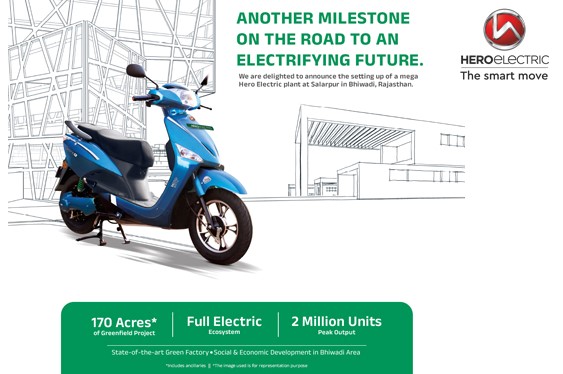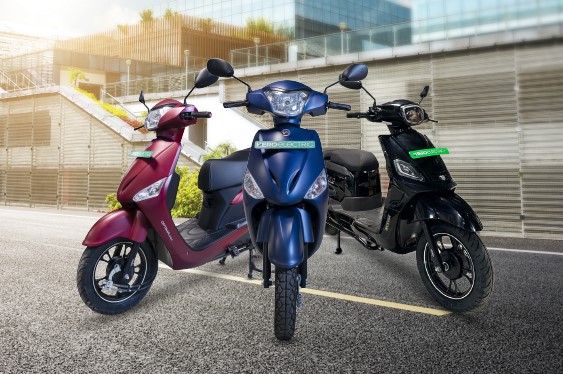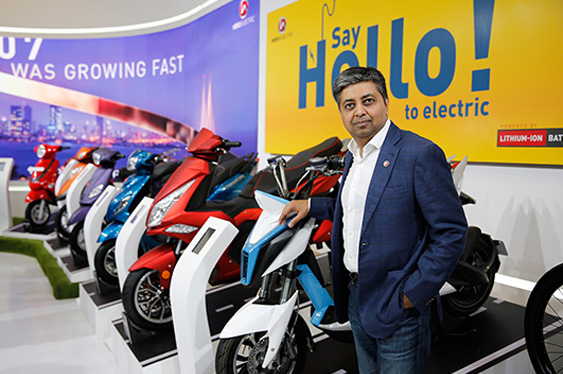Hero Electric, India’s largest zero-emission two-wheeler maker, will set up a greenfield manufacturing unit in Rajasthan entailing an expenditure of Rs 1,200 crore, its managing director, Naveen Munjal, told ET.
The facility, to be set up in the Salarpur industrial region, will be spread over 170 acres and have an annual capacity of 2 million units, he said, adding that it will also accommodate a vendor company that will invest an additional Rs 400 crore in the facility.
According to Munjal, the company had signed an agreement with the Rajasthan government for the facility earlier this month and it is likely to go on stream by the middle of 2023. Hero Electric aims to reach 5 million units annual capacity by 2025.
“The demand is robust; we have a substantial waiting-list and we are resolving the supply chain challenges,” said Munjal. “We want to be ready with capacity, as adoption to EVs gains momentum. The market, I believe, is going to move much faster than anyone could imagine. The awareness is growing, the cost of operation is lower.”The strategic location of the plant—being within 100 km of Delhi airport and close to automotive clusters in the National Capital Region–will ensure smooth connectivity and efficient logistics.
The upcoming facility will be equipped with modern equipment, robotics and innovative technologies. It will utilise sustainable and renewable resources like solar energy.
The company also has a new manufacturing line in Ludhiana which will go onstream in another six months with a capacity of 250,000 units. It will ensure adequate capacity to meet demand.
Hero Electric has already started production at Pithampur in alliance with Mahindra & Mahindra to tap the increase in demand. The company will get about 250,000 units capacity out of the central India facility of Mahindra.
To fund this expansion, Hero has begun talks with the private equity investors to raise money. The deal is likely to be concluded shortly.
“We are engaged in a discussion. There is a strain on our working capital, plus we would need money to scale the cap scale the capacity further,” Munjal said. “Within a quarter we should be able to raise (about $150-200 million) money. It will be a combination of debt and equity.”
Munjal claimed that from a localisation stand-point, the company is complying with regulations to meet the FAME 2 benefits, and it will continue to work with local partners to ensure level of high localisation.
Hero Electric is set to launch three new models in the coming six months which will be high-speed and will have a high degree of smart technology, Munjal said.
“The belly of the market or commuter demand is still at the city speed 45-60 km per hour. However, there is a growing acceptability in the higher speed (60-80 km per hour) segment. You will see us participating in that space more aggressively in the future,” said Munjal.
According to Munjal, the space is transforming from a “pond to an ocean”, and there is a need to create the enabling infrastructure to ensure smooth ownership experience for future EV buyers.
Hero Electric has over 850 touch-points across the country, which it plans to grow by over 80% to 1,500 units within two years. The company is also working with multiple partners in setting up over 100,000 charging stations across the country.
Munjal claimed that Hero has already worked with more than 8,500 roadside mechanics to ensure on-ground support to its customers. The company will be reaching out to 20,000 more mechanics over the next two years, he said.
Apart from serving individual buyers, Hero Electric plans to reinforce its offering to the B2B commercial segment. In FY23, the company plans to sell about 20,000 units, which Munjal expects to scale to 50,000 units in the next financial year.


